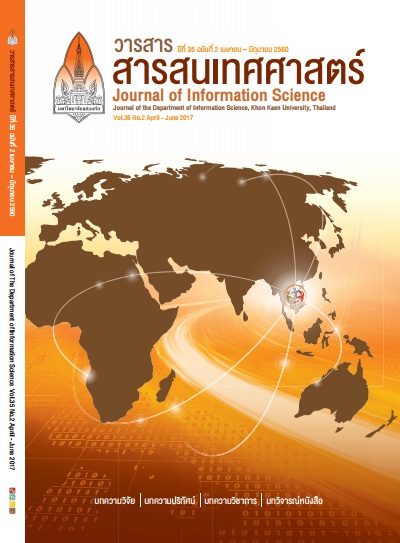Embedded Knowledge Creation as a Crucial Tool for Developing Organizational Product: a Development of Environmental Friendly Construction Material from Solid Waste
Keywords:
การจัดการความรู้, การจัดการโครงการ, การสร้างความรู้, ความรู้ฝังแน่นAbstract
This research aims to analyze the creation of embedded knowledge via project implementation and project activities. The research was performed in a profound study style based on the qualitative approach, and was designed as a case study. The authors studied the project implementation processes and project activities in order to analyze the construction processes of embedded knowledge and the major components of knowledge construction. As a case study, the authors have taken the project entitled integrated solid waste management model of Khon Kaen University combing multi-disciplinary knowledge, comprising of public health science, engineering, science and economics, in order to manage as well as to transform non-toxic wastes obtained from Khon Kaen University’s refuge into green construction material. The conceptual framework of this study combined the notion of project life-cycle proposed by the Project Management Institute (2015) with the SECI model explaining about knowledge creation by Nonaka & Takeuchi (1995) under the assumption that the project and co-working of the project team was the platform or Ba in theSECI model for exchanging, transferring and using the project knowledge. Additionally, most of the data collected was qualitative data obtained from document analysis in order to understand about overall process of project works and knowledge used in the project. Subsequently, we conducted in-depth interviews with 15 of project leader, members, and stakeholders for assessing the linkage between the used knowledge, knowledge creation process and knowledge management in the views of project-team workers. To ensure about all of collected data and information, a non-participation observation was conducted on operations of the project members as well as on project sites. Finally, all of collected data and information was analyzed based on the method of qualitative approach together with illustrated the linkage between the used knowledge and project activity and subsequently, demonstrated the obtained result of our research work.
The results showed that knowledge creation via project implementation has to depend upon macro knowledge accumulated in form of academic knowledge together with past experience of project members. The macro knowledge is a key ingredient in the development of the new generation is the knowledge that is embedded in the knowledge of the project team. The process can be created through the collaboration of the project team in conjunction with the use of data and information obtained from specific area as an important base for creating new knowledge. The authors found that knowledge generation at the project-implemen- tation level can be into two main part: knowledge identification, and knowledge creation. For the former part, the knowledge identification is important in terms of defining the concept, activity planning and teamwork. On the other hand, for the latter part, the knowledge creation is comprising of three parts. (1) Knowledge creation at beginning stage is a step in which each team sub-team gathers the necessary data and information in order to perform their work. The obtained data and information can be considered to be micro knowledge for integrating with project-team members’ knowledge and experience in order to develop a new knowledge to solve the problems occurred during their work. (2) Knowledge creation at intermediate stage via knowledge integration is mixing all of the micro knowledge obtained during project implementation with the macro knowledge in order to generate the new knowledge by performing economic feasibility analysis in order to leverage micro-knowledge gained from each sub-team as a result of the project. (3) Knowledge creation at conclusion stage via knowledge confirmation is a step for taking the new organizational knowledge of the organization or product for actual implementation in the focusing area in order to verify the usefulness of the new knowledge. The main factors contributing to the generation of new knowledge from the project implementation are: (1) academic knowledge and experience of the project-team member, (2) trust, and (3) recording of knowledge.








